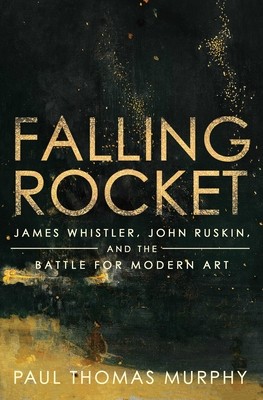
- We will send in 10–14 business days.
- Author: Paul Thomas Murphy
- Publisher: Pegasus Books
- ISBN-10: 1639364919
- ISBN-13: 9781639364916
- Format: 15.2 x 23.1 x 3.1 cm, kieti viršeliai
- Language: English
- SAVE -10% with code: EXTRA
Reviews
Description
The untold story of the artistic battle between James Abbot MacNeill Whistler and John Ruskin over Whistler's controversial, ground-breaking Nocturne in Black and Gold: The Falling Rocket. In November 1878, America's greatest painter sued England's greatest critic for a bad review. The painter won--but ruined himself in the process. The painter: James Abbot MacNeill Whistler, whose combination of incredible talent, unflagging energy, and relentless self-promotion had by that time brought him to the very edge of artistic preeminence. The critic: John Ruskin, Slade Professor of Art at Oxford University, whose four-decades' worth of prolific and highly respected literary output on aesthetics had made him England's unchallenged and seemingly unchallengeable arbiter of art. Though Whistler and Ruskin both lived in London and moved in the same artistic world, they had, until June, 1877, managed to remain entirely clear of one another. This was unusual because Whistler had a mercurial temperament, a belligerent personality, and seemed to thrive on opposition: he once challenged a man to a duel because the man accused the painter of sleeping with his wife. (Whistler had, in fact, slept with the man's wife.) That November, John Ruskin walked into the Grosvenor Gallery's new exhibition of art and gazed with horror upon Whistler's Nocturne in Black and Gold: The Falling Rocket. The painting was Whistler's interpretation of a fireworks display at a local pleasure garden. But to Ruskin it was nothing more than a chaotic, incomprehensible mess of bright spots upon dark masses: not art but its antithesis--a disturbing and disgusting assault upon everything he had ever written or taught on the subject. He quickly channeled that anger into a seething review. The internationally-reported, widely discussed, and hugely-entertaining trial that followed was a titanic battle between the opposing ideas and ideals of two larger-than-life personalities. For these two protagonists, Whistler v Ruskin was the battle of a lifetime--or more accurately, a battle of their two lifetimes. Paul Thomas Murphy's Falling Rocket also recounts James Whistler's turbulent but triumphant development from artistic oblivion in the 1880s to artistic deification in the 1890s, and also Ruskin's isolated, befogged, silent final years after his public humiliation. The story of Whistler v Ruskin has a dramatic arc of its own, but this riveting new book also vividly evokes an artistic world in energetic motion, culturally and socially, in the last decades of the nineteenth century.EXTRA 10 % discount with code: EXTRA
The promotion ends in 21d.20:25:27
The discount code is valid when purchasing from 10 €. Discounts do not stack.
- Author: Paul Thomas Murphy
- Publisher: Pegasus Books
- ISBN-10: 1639364919
- ISBN-13: 9781639364916
- Format: 15.2 x 23.1 x 3.1 cm, kieti viršeliai
- Language: English English


Reviews